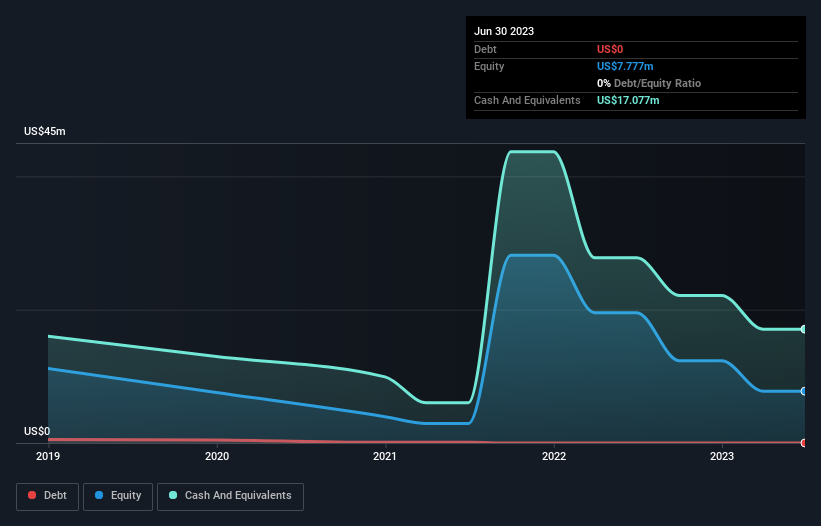We can readily understand why investors are attracted to unprofitable companies. For example, biotech and mining exploration companies often lose money for years before finding success with a new treatment or mineral discovery. But while the successes are well known, investors should not ignore the very many unprofitable companies that simply burn through all their cash and collapse.
So, the natural question for Windward (LON:WNWD) shareholders is whether they should be concerned by its rate of cash burn. In this article, we define cash burn as its annual (negative) free cash flow, which is the amount of money a company spends each year to fund its growth. Let's start with an examination of the business' cash, relative to its cash burn.
View our latest analysis for Windward
Does Windward Have A Long Cash Runway?
A company's cash runway is calculated by dividing its cash hoard by its cash burn. As at June 2023, Windward had cash of US$17m and no debt. Looking at the last year, the company burnt through US$9.1m. So it had a cash runway of approximately 23 months from June 2023. While that cash runway isn't too concerning, sensible holders would be peering into the distance, and considering what happens if the company runs out of cash. We should note, however, that if we extrapolate recent trends in its cash burn, then its cash runway would get a lot longer. You can see how its cash balance has changed over time in the image below.

How Well Is Windward Growing?
Windward reduced its cash burn by 6.1% during the last year, which points to some degree of discipline. Revenue also improved during the period, increasing by 18%. On balance, we'd say the company is improving over time. While the past is always worth studying, it is the future that matters most of all. So you might want to take a peek at how much the company is expected to grow in the next few years.
How Easily Can Windward Raise Cash?
Windward seems to be in a fairly good position, in terms of cash burn, but we still think it's worthwhile considering how easily it could raise more money if it wanted to. Issuing new shares, or taking on debt, are the most common ways for a listed company to raise more money for its business. Commonly, a business will sell new shares in itself to raise cash and drive growth. We can compare a company's cash burn to its market capitalisation to get a sense for how many new shares a company would have to issue to fund one year's operations.
Windward has a market capitalisation of US$79m and burnt through US$9.1m last year, which is 12% of the company's market value. As a result, we'd venture that the company could raise more cash for growth without much trouble, albeit at the cost of some dilution.
Is Windward's Cash Burn A Worry?
The good news is that in our view Windward's cash burn situation gives shareholders real reason for optimism. One the one hand we have its solid cash burn relative to its market cap, while on the other it can also boast very strong cash runway. While we're the kind of investors who are always a bit concerned about the risks involved with cash burning companies, the metrics we have discussed in this article leave us relatively comfortable about Windward's situation. Taking an in-depth view of risks, we've identified 4 warning signs for Windward that you should be aware of before investing.
Of course Windward may not be the best stock to buy. So you may wish to see this free collection of companies boasting high return on equity, or this list of stocks that insiders are buying.
Valuation is complex, but we're here to simplify it.
Discover if Windward might be undervalued or overvalued with our detailed analysis, featuring fair value estimates, potential risks, dividends, insider trades, and its financial condition.
Access Free AnalysisHave feedback on this article? Concerned about the content? Get in touch with us directly. Alternatively, email editorial-team (at) simplywallst.com.
This article by Simply Wall St is general in nature. We provide commentary based on historical data and analyst forecasts only using an unbiased methodology and our articles are not intended to be financial advice. It does not constitute a recommendation to buy or sell any stock, and does not take account of your objectives, or your financial situation. We aim to bring you long-term focused analysis driven by fundamental data. Note that our analysis may not factor in the latest price-sensitive company announcements or qualitative material. Simply Wall St has no position in any stocks mentioned.
About AIM:WNWD
Windward
Operates as a predictive intelligence company in Israel and internationally.
Excellent balance sheet very low.
Similar Companies
Market Insights
Community Narratives




